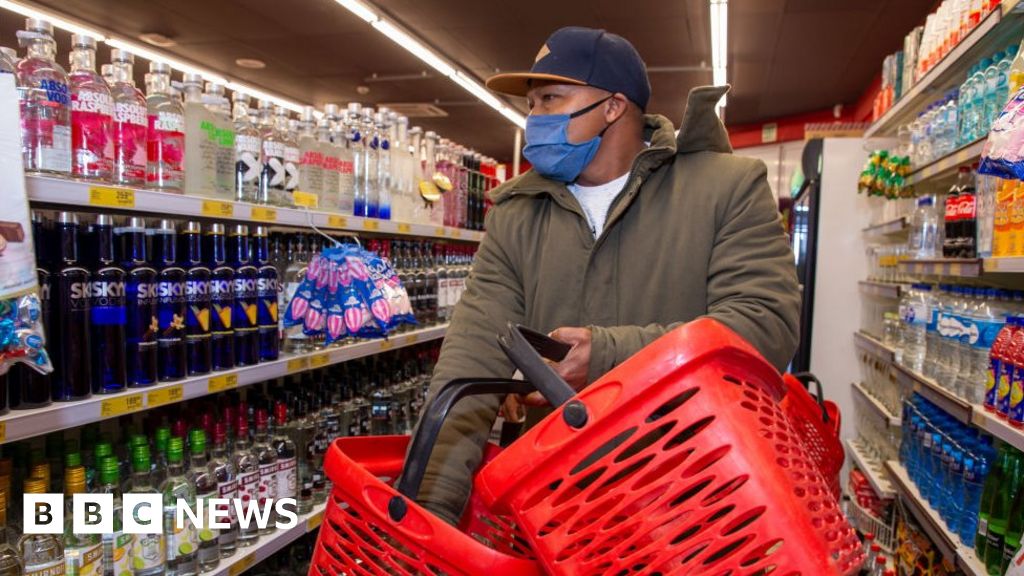
 Image copyright
Image copyright
AFP
Authorities say the ban will take pressure off the health system
The reintroduction of a ban on the sale of alcohol to help curb the spread of the coronavirus has divided South Africans.
President Cyril Ramaphosa said the ban, the second this year, would take pressure off the health system.
While some backed him, others said he was blaming citizens for his government’s failures.
When it comes to coronaviruses, South Africa is the most affected country in Africa with over 275,000 cases.
The resulting deaths from Covid-19 have also risen to more than 4,000, and government projections estimate that this could increase to 50,000 by the end of the year.
The main opposition party, the Democratic Alliance, said the government was using the alcohol ban as a scapegoat for failing to provide adequate medical care.
Julius Malema, the leader of the opposition Economic Freedom Fighters, tweeted that the president had ignored his warning not to lift the alcohol ban first imposed in March.
He added that Ramaphosa should also close schools that resumed last month after several weeks.
On Twitter, people are using the hashtag #AlcoholHasFallen to express their support or disgust for the president, who announced the renewed alcohol ban on Sunday night.
Some South Africans reflected on how the ban could affect the economy.
One woman highlighted how people involved in the hotel industry would be losing jobs.
“After almost two years of not working, my sister finally found a job, unfortunately her job ended last night,” she tweeted.
Another Twitter user posted a short video clip of a sad song saying goodbye to alcohol:
However, supporters of the president said the ban would help deal with antisocial behavior:
And some have joked that South Africans should take out their home brew kits again after there was a reported increase in pineapple-based homemade alcohol during the latest ban.
President Ramaphosa also announced a nightly curfew and said that wearing outdoor masks was now mandatory.
Coronavirus infections have exploded in the past two weeks, straining the health system, especially the state hospitals on which 80% of the population depends.
They are simply running out of beds, and part of that, according to health experts, is due to alcohol-related trauma.
More than 40% of the 40,000 trauma cases reported here in a week are alcohol related, something the health system cannot afford at the moment.
However, the alcohol ban also affects the jobs of those who depend directly or indirectly on the industry.
For the authorities, it has come down to a crude balance between saving lives and preserving livelihoods, and it is an impossible dance.
Last week, South Africa recorded the largest increase in cases in a single day. Almost half were in Gauteng, a province that is becoming the epicenter of the outbreak.
In his speech, Ramaphosa acknowledged that “most” of the people had taken steps to help prevent the spread, but said that some still acted “without any responsibility to respect and protect each other.”
Image copyright
Reuters
President Cyril Ramaphosa said South Africa was facing a storm
“There are a number of people who have dedicated themselves to organizing parties, who have drunk alcoholic beverages and some who walk through crowded spaces without wearing masks,” said the president.
Ramaphosa said new measures were being introduced to help the country weather the coronavirus storm, and that the state of emergency will last until August 15. The nightly ban would be in effect from 9:00 PM to 4:00 AM.
The government also made 28,000 hospital beds available for Covid-19 patients. But President Ramaphosa said the country still faces a “severe” shortage of more than 12,000 health workers, including nurses, doctors and physical therapists.
The alcohol ban comes just weeks after another three-month ban was lifted in an effort to avoid bouts of drunkenness, reduce domestic violence, and eliminate excessive alcohol use over the weekend in South Africa.
Doctors and police say the previous ban contributed to a sharp drop in emergency hospital revenue. But the country’s brewers and winemakers complained that they were being thrown out of business.

Media playback is not supported on your device